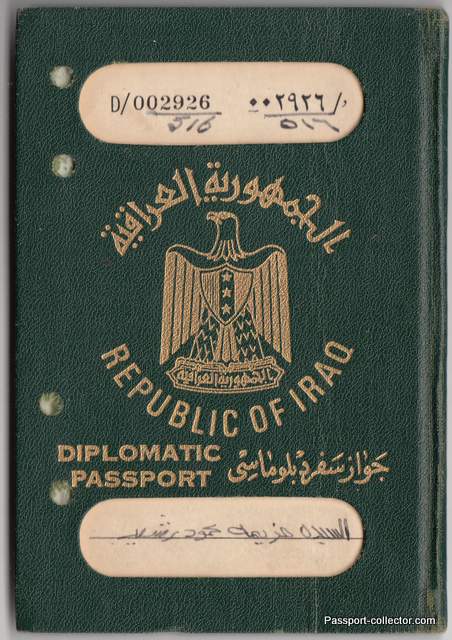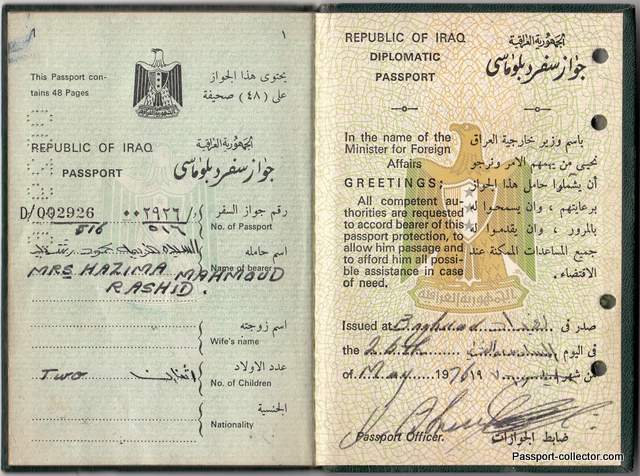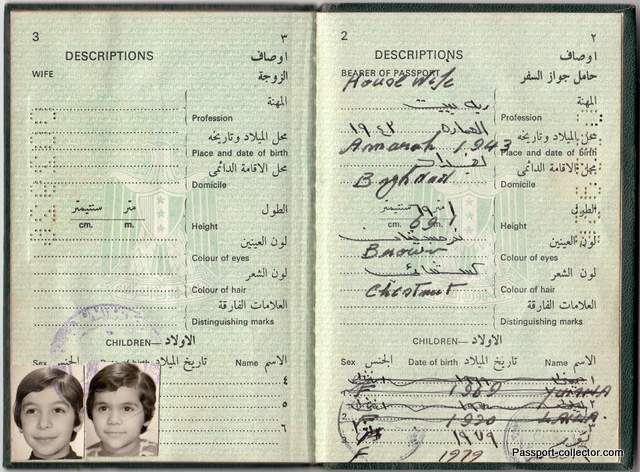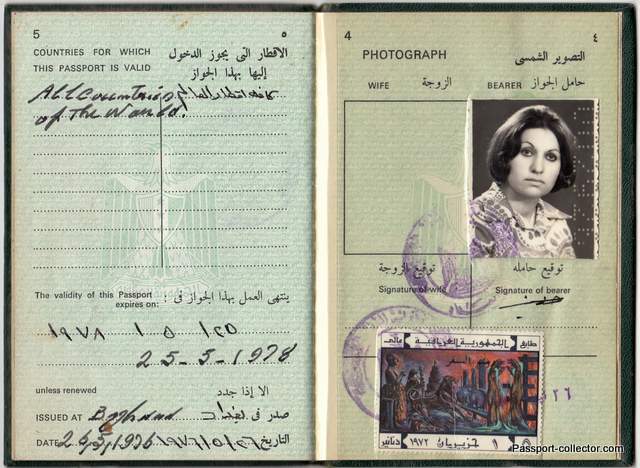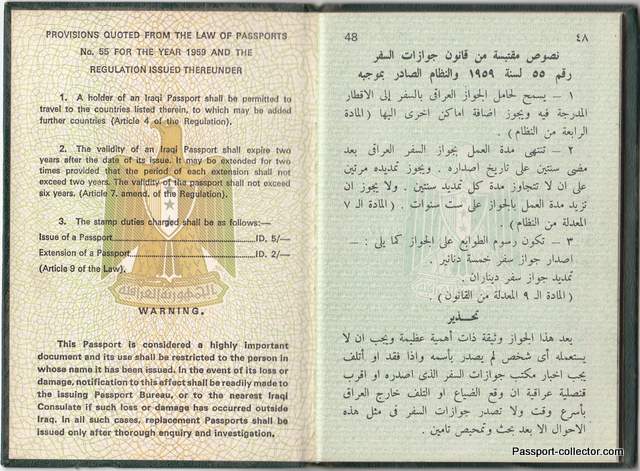Iraq Diplomatic Passport Al-Bakr Presidency
Following the Arab Socialist Ba’ath Party’s ouster from government in 1963, Al-Bakr and the party pursued underground activities and became vocal government critics. During this period, Al-Bakr was elected by the Ba’ath Party’s Iraqi branch’s Secretary-General (the head) and appointed his cousin, Saddam Hussein, to be the party cell’s deputy leader.
Al-Bakr and the Ba’ath Party regained power in the coup of 1968, later referred to as the 17 July Revolution. In the coup’s aftermath, al-Bakr was elected Chairman of the Revolutionary Command Council and President; he was later appointed Prime Minister. Saddam, the Ba’ath Party’s deputy, became Deputy Chairman of the Revolutionary Command Council and Vice President and was responsible for Iraq’s security services.
During his rule, Iraq was blossoming; high economic growth due to high international oil prices strengthened Iraq’s role in the Arab world and increased the people’s standard of living. Land reforms were introduced, and wealth was distributed more equally. A sort of socialist economy was established in the late-1970s under the direction of Saddam.
Al-Bakr gradually lost power to Saddam in the 1970s, when the latter strengthened his position within the party and the state through security services. In 1979, al-Bakr resigned from all public offices for “health reasons” and died in 1982.
The Iraq Diplomatic Passport
- Hardcover (with four punched holes to make the document obsolete in 1982)
- 48 pages total, 30 with visas and revenues
- Issued to a family of four (mother and three kids)
- Passport No# D/002926
- excellent condition
- RARE!
Update 4/24/22: One of the children mentioned in the passport contacted me six years after the article was published. It was lovely to hear from Layla, who lives now in Istanbul. Here is an extract of her email…
“Hello, I was happy to see myself in one of the passports in your collection, to see the trips we made with my family, although I don’t know how this passport reached you, but thank you for collecting it and keeping it in such a good shape. It is a beautiful piece of history. It was a flourished era in Iraq immediately before the series of wars in the region. We used to go to London to buy our clothes then go to Rome to enjoy the Pizzas. I am the kid on the left of this passport of my late mother.”
I offered Layla the pictures of her mother’s diplomatic passport.
FAQ Passport History
Passport collection, passport renewal, old passports for sale, vintage passport, emergency passport renewal, same day passport, passport application, pasaporte passeport паспорт 护照 パスポート جواز سفر पासपोर्ट
1. What are the earliest known examples of passports, and how have they evolved?
The word "passport" came up only in the mid 15th Century. Before that, such documents were safe conducts, recommendations or protection letters. On a practical aspect, the earliest passport I have seen was from the mid 16th Century. Read more...
2. Are there any notable historical figures or personalities whose passports are highly sought after by collectors?
Every collector is doing well to define his collection focus, and yes, there are collectors looking for Celebrity passports and travel documents of historical figures like Winston Churchill, Brothers Grimm, Johann Wolfgang von Goethe. Read more...
3. How did passport designs and security features change throughout different periods in history, and what impact did these changes have on forgery prevention?
"Passports" before the 18th Century had a pure functional character. Security features were, in the best case, a watermark and a wax seal. Forgery, back then, was not an issue like it is nowadays. Only from the 1980s on, security features became a thing. A state-of-the-art passport nowadays has dozens of security features - visible and invisible. Some are known only by the security document printer itself. Read more...
4. What are some of the rarest and most valuable historical passports that have ever been sold or auctioned?
Lou Gehrig, Victor Tsoi, Marilyn Monroe, James Joyce, and Albert Einstein when it comes to the most expensive ones. Read more...
5. How do diplomatic passports differ from regular passports, and what makes them significant to collectors?
Such documents were often held by officials in high ranks, like ambassadors, consuls or special envoys. Furthermore, these travel documents are often frequently traveled. Hence, they hold a tapestry of stamps or visas. Partly from unusual places.
6. Can you provide insights into the stories behind specific historical passports that offer unique insights into past travel and migration trends?
A passport tells the story of its bearer and these stories can be everything - surprising, sad, vivid. Isabella Bird and her travels (1831-1904) or Mary Kingsley, a fearless Lady explorer.
7. What role did passports play during significant historical events, such as wartime travel restrictions or international treaties?
During war, a passport could have been a matter of life or death. Especially, when we are looking into WWII and the Holocaust. And yes, during that time, passports and similar documents were often forged to escape and save lives. Example...
8. How has the emergence of digital passports and biometric identification impacted the world of passport collecting?
Current modern passports having now often a sparkling, flashy design. This has mainly two reasons. 1. Improved security and 2. Displaying a countries' heritage, icons, and important figures or achievements. I can fully understand that those modern documents are wanted, especially by younger collectors.
9. Are there any specialized collections of passports, such as those from a specific country, era, or distinguished individuals?
Yes, the University of Western Sidney Library has e.g. a passport collection of the former prime minister Hon Edward Gough Whitlam and his wife Margaret. They are all diplomatic passports and I had the pleasure to apprise them. I hold e.g. a collection of almost all types of the German Empire passports (only 2 types are still missing). Also, my East German passport collection is quite extensive with pretty rare passport types.
10. Where can passport collectors find reliable resources and reputable sellers to expand their collection and learn more about passport history?
A good start is eBay, Delcampe, flea markets, garage or estate sales. The more significant travel documents you probably find at the classic auction houses. Sometimes I also offer documents from my archive/collection. See offers... As you are already here, you surely found a great source on the topic 😉
Other great sources are: Scottish Passports, The Nansen passport, The secret lives of diplomatic couriers
11. Is vintage passport collecting legal? What are the regulations and considerations collectors should know when acquiring historical passports?
First, it's important to stress that each country has its own laws when it comes to passports. Collecting old vintage passports for historical or educational reasons is safe and legal, or at least tolerated. More details on the legal aspects are here...
Does this article spark your curiosity about passport collecting and the history of passports? With this valuable information, you have a good basis to start your own passport collection.
Question? Contact me...


